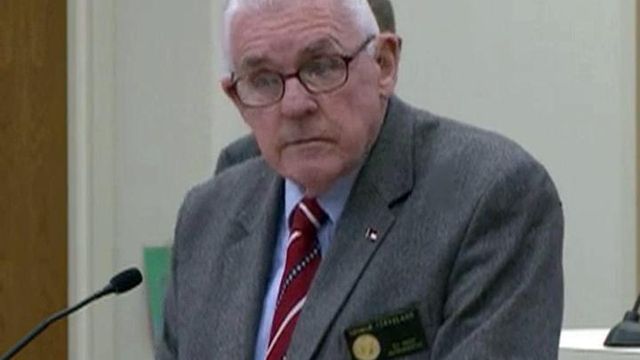Climate change denier behind Public Staff bill?
A proposal to muzzle the Public Staff of the NC Utilities Commission came out of an email exchange between a member of the staff and a noted climate change denier.
Posted — UpdatedThe sponsor, Rep. George Cleveland, R-Onslow, a friend of Droz, didn’t mention that detail Wednesday in a hearing on the legislation.
Cleveland told the Utilities Committee the bill “is designed to have the Public Staff actually represent the folks that they’re charged to represent – the using and consuming public.”
“Presently, the Public Staff follows and works toward the administration’s positions or the legislative intent of the legislature – or what they deem as legislative intent,” Cleveland explained. “This bill will require that they concentrate on the using and consuming public."
“I was under the impression the group they represented is the using and consuming public,” said Rep. Ruth Samuelson, R-Mecklenburg.
“Presently, the public staff does not do that,” Cleveland responded. “Their focus is on what they think is legislative or administrative intent.”
“But the legislators are elected by the consuming public,” Samuelson said.
“I’ve been here a long time,” Cleveland replied, “and you and I both know many things get passed in the General Assembly that are not really in the interest of the using and consuming public.”
Rep. Nelson Dollar, R-Wake, said he had worked with the Public Staff during his time at the Department of Commerce. “They were extremely professional, extremely proficient. They were one of the best groups I worked with,” he said.
He expressed concern about the subjective nature of the “best interest” of the public. “Who is going to make that judgment?” Dollar asked. “Is it just going to be folks’ opinion? Who governs that?”
Dollar asked for examples of situations that would have constituted violations of the proposed bill.
Cleveland said he “couldn’t give exact details” but had been personally involved in two such incidents: one involving the raising of fees several years ago, and more recently, “some wind energy hearings that they held.“
Asked again for more detail, Cleveland offered a quote from an email he said “was sent to me some some time ago.”
“The Public Staff does not have the right to advocate positions contrary to those mandated by the General Assembly,” he read. “They’re representing legislative intent or administrative desires.”
Rep. Harry Warren, R-Rowan, asked Cleveland to consider tabling the bill until the committee could get more information on the problem.
Cleveland reluctantly agreed. The bill could resurface at a later hearing.
The committee also heard testimony from Robert Gruber, the 30-year executive director of the Public Staff, who said the agency’s duties are clearly outlined in statute already.
“I think we’ve tried to be professional over the years,” Gruber said. “I’ve never heard anybody say we’ve acted in a political manner at the behest of any administration.”
“If it’s not broke, don’t fix it,” he advised. ”I don’t know exactly what the problem the bill’s trying to correct is.”
The genesis of the bill, Cleveland later confirmed, was an email exchange between Public Staff attorney Tim Dodge and wind energy opponent Droz of the American Tradition Institute, a climate change denial think tank.
In the exchange, which went from January through August 2012, Droz repeatedly questioned why the Public Staff was not following the Maine Public Staff, which recently spoke against expansion of wind generation because it had the potential to increase consumer energy prices.
North Carolina’s Public Staff did not take that position in recent discussions of a legislative requirement for utilities here to develop renewable energy portfolios.
A member of the Public Staff, Kennie Ellis, gave testimony at a December 2011 presentation about a wind energy project. In his remarks, he did not speak out against the project. That appears to be what provoked Droz’s ire.
For months, Droz badgered Dodge with rambling, condescending, sometimes strange messages. "Your answer to Comment #5: is unsatisfactory," he wrote in one reply. He complained when Dodge did not respond, copying more than a dozen legislators, including leaders in both chambers. Cleveland was always first on the list.
On April 18, 2012, Cleveland intervened on Droz’s behalf.
“Mr. Dodge," he wrote, “I have also been patiently waiting for your reply to Mr. Droz’s questions. I believe he has raised some very valid points as to the operation of the NCUC Public Staff that I would like answered.”
In an April 26 email, Dodge offered to meet with Cleveland “and talk about what issues you feel have not been addressed in my comments,” but it’s not clear whether any such meeting ever happened.
Related Topics
Copyright 2024 by Capitol Broadcasting Company. All rights reserved. This material may not be published, broadcast, rewritten or redistributed.





